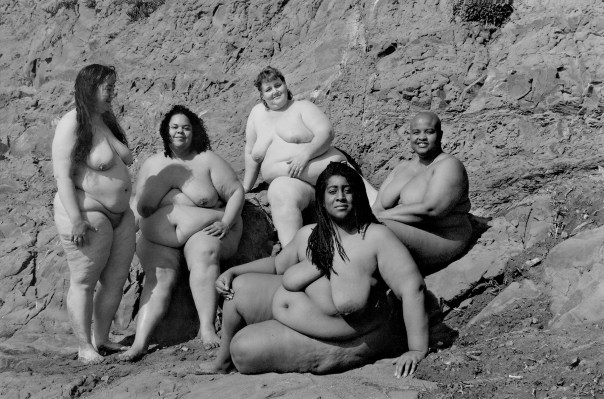Laurie and Debbie say:
In Australia, the handmade cosmetics company Lush has launched an advertising campaign called “Go Naked,” which, as Brad Esposito at BuzzFeed reports, has met with both praise and opposition.
Most responses to the campaign have been positive,says Courtney Fry, an employee and one of the models:
“We have also had requests from customers wanting to continue the campaign in store and pose for the photo themselves as they felt it helped their children grow up feeling that their bodies are natural and normal, not something to be ashamed of and have our insecurities exploited for the sale of cosmetics.”
but a few complaints caused the Australian Advertising Standards Board to declare the images “pornographic” and ask Lush to remove them from a mall in Queensland, which the company agreed to do.
These images are close to our hearts. Laurie’s photograph above, from Women En Large, is fine art and not advertising, but the commonalities with the Lush campaign are very real. Both, for very different purposes, are committed to showing real bodies, women comfortable together, and satisfied with who they are.
While it’s no surprise that a small portion of the population finds these images disturbing and inappropriate, it’s interesting to think about why. The complaints quoted in the BuzzFeed article are all about what children will see: the images were apparently on large billboards at eye level.
To worry about children seeing these photographs, you have to make several assumptions. So many parents displace their own fears, discomforts, and learned objections onto their children.
First, they assume it’s inappropriate for children to see nudity (or certain kinds of nudity). Why? Because children can be (“because I am”) unsettled and confused by sexuality (which we are bombarded with in thousands of ways every day) and somehow sexuality and nudity have become conflated, even though almost everyone is nonsexually nude for at least some moments every day.
Second, they assume it’s inappropriate for children to see (“for me to see”) certain kinds of touch. The women touching each others’ butts in the top advertisement are not engaging in sexual behavior, but they are engaging in intimate touch, and many people have no concept of intimate nonsexual touch, so the connection must be sexual or it would have no context and be incomprehensible.
Third, these images raise fears that your child might become a Lesbian, or bring home a fat sweetheart, or whatever combination of fears you have for your child’s puberty, adolescence, and adulthood.
Finally, and most threatening, pictures like these (and like Laurie’s) normalize a kind of body comfort and comfort with other bodies which children might (“oh, how horrible, I might”) begin to believe is okay, or even something to look for in life.
Lush has the right idea:
Lush’s Australasia director, Peta Granger, said the decision from the ASB would not affect the way they advertise in the future.
“We want our messages to empower people, not make them feel awful about themselves over a body that is probably not ever real due to how much it’s been digitally ‘enhanced’.”


